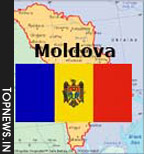Moldova Communists set to win polls in uncertain times
 Chisinau - Europe's poorest country Moldova appears set to return the ruling Communist party to power in parliamentary elections on Sunday, but future political stability in the former Soviet republic remains less certain.
Chisinau - Europe's poorest country Moldova appears set to return the ruling Communist party to power in parliamentary elections on Sunday, but future political stability in the former Soviet republic remains less certain.
While party leader and President Vladimir Voronin is serving out his last legal term of office, polls indicate that his Communist party will keep the majority it has held in parliament since 2005, despite local election setbacks in 2007. Opposition parties could capture as much as a third of next legislature, observers said.
Russia and Europe will also be watching the elections and the emerging government in Chisinau closely.
Whether with or without Voronin, coalition or pure Communist, democratic or less so, functional or incompetent, Moldova's new government is facing daunting problems at home and abroad.
The list of issues is topped by the Transnistria territorial standoff, in which Chisinau is pitted against a renegade Moldovan province supported by the Kremlin.
Since its 1991 independence, Moldova has conducted free and fair elections with by regional standards minimal fudging, highlighting Moldova's tradition of being the only CIS state outside the Baltic region to reject massive vote fraud.
However, the run-up to this Sunday's polls has shown signs that this democratic trend may be coming to an end, with opposition spokesmen accusing the Communists of manipulating state-owned media and handing out taxpayer-financed food to influence the upcoming vote result.
But using the tools of government to support one's candidates cuts both ways in Moldova. According to local estimates, the Communists control 11 provincial councils, while assorted opposition groups run 14 councils including the powerful city of Chisinau. The 8 remaining councils are up for grabs.
Moldova Communists have focused on stability. Rejecting the opposition as unprofessional, the Communicts claim they are the country's only political organization with enough experience and broad public appeal to guide a united Moldova through hard times.
Typical was the most recent Communist television spot featuring a young actress in a peasant blouse, holding a baby in her lap, and telling viewers "I want my child to grow up safely, in a stable Moldova, and I would only trust his future to the Communists."
Stealing opposition thunder is another tactic embraced by Moldova's Communists, with the party in support of all types of Capitalist policies, among them European integration, market reforms, free trade, free movement of citizens, and eventual reunification with Transnistria, but not by war.
Moldova's economy is heavily dependant on wine and tobacco exports, with biggest market for Moldovan wine in Russia, and for tobacco in Europe. Unsurprisingly, the Communists and the opposition both support Moldova's "international neutrality," avoiding both NATO and Russian alliance.
Moldova earns foreign income from its citizens employed abroad, who send their salaries home, usually from migrant labour jobs in Italy, Spain, or Portugal. As much as one-third of Moldova's entire GDP enters the economy from these worker's paychecks.
An important factor in the upcoming election will be the degree to which these migrant labourers, who often work illegally, will actually cast ballots, said longtime Moldova analyst Anton Golea, in an Infotag news agency report.
With party programmes between the Communists and the opposition so close, the only tangible offer made by opposition parties to voters so far, appears simply to be that they are not Communists and would allegedly run government more honestly.
The Liberal Party, led by Chisinau mayor Dorin Chirtoaca, is perhaps the most distinctive. It has positioned itself as a "new force" in Moldovan government, and leans heavily towards tight relations with Romania, which until 1940 counted Moldova as one of its provinces.
So far, however, this opposition pitch seems to be only marginally appealing to Moldovan voters. Only two of Moldova's 12 registered centre-right parties, Chirtoaca's Liberals and the Liberal-Democrats, are on track to surpass the 6-per-cent hurdle needed by a party to send deputies to the legislature.
Together, the two parties should capture some 17 to 20 per cent of the popular vote, and 25 - 30 per cent of the next parliament's seats, according to recent polls.
Five other Moldovan parties, two of them even more nationalist than the Liberals, have a chance of overcoming the 6 per cent barrier, according to polls. The more that get in, the worse for Moldovan stability, experts said.
"A splintered parliament devoid of a consistent majority, with unstable a government hostage to squabbling minority factions, could result in a "Ukrainization" of Moldova's politics... and impasse," wrote Vladimir Socor, a Jamestown Foundation Moldova expert. (dpa)